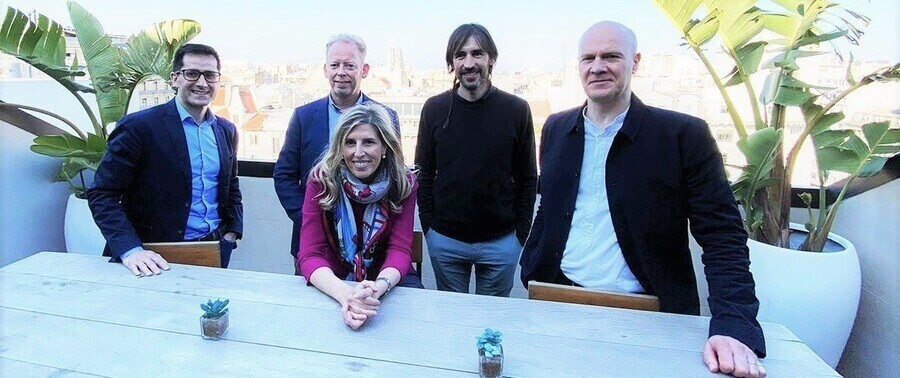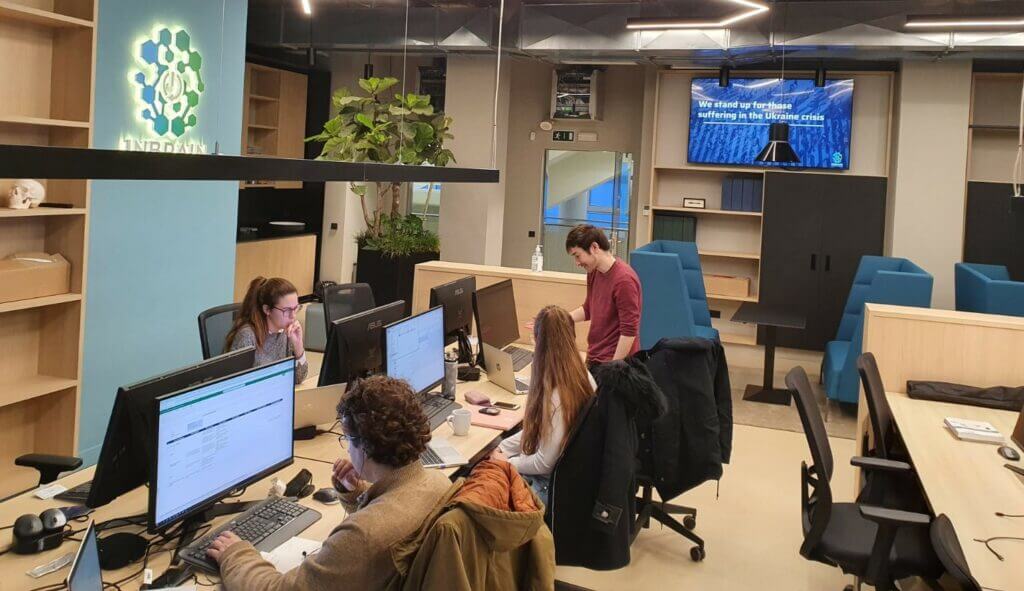
InBrain, a spin-off company from ICN2 and ICREA, joins Barcelona Science Park
InBrain Neuroelectronics, a spin-off from ICN2 and ICREA that is developing and commercialising graphene neuroelectric interfaces and smart neuromodulation systems to treat neurological diseases, has open a new laboratory in the Barcelona Science Park. The company, which raised €14 million in 2021 in one of the biggest rounds of investment in the Spanish medtech sector, has already completed in-vitro and in-vivo validation of its technology.
InBrain Neuroelectronics was founded in 2020 as a spin-off of the Catalan Institute of Nanoscience and Nanotechnology (ICN2) and ICREA, members of the Graphene Flagship, by Carolina Aguilar (CEO), neuroscientist and business executive with over 15 years of experience in medtech; Jose A. Garrido (CSO), ICREA professor and group leader at ICN2; Kostas Kostarelos (Independent Consultant), group leader at ICN2 and chair of Nanomedicine at the Faculty of Biology, Medicine and Health and the National Graphene Institute at the University of Manchester; Anton Guimerà-Brunet (Technology Advisor), staff researcher at IMB-CNM (CSIC), with a strong background in developing medical devices and systems integration for novel technology; and Bert Bakker (CTO), a highly skilled executive and recognized expert in electronics with over 30 years of successful career path leading cross-functional teams in the development of high-risk (Class III) medical devices in large international companies.
Rounding out the InBrain’s leadership team are two world-renowned experts in neurotechnology Jurriaan Bakker and Michel Decrè, as company shareholders.
InBrain was created out of a multidisciplinary frontier research project, at the intersection of medtech, deeptech and digital health, with proprietary intellectual technology resulting from the collaboration between ICN2 and the National Graphene Institute at the University of Manchester. The spin-off was set up with the mission of decoding brain signals by developing smart neuroelectronic therapies based on graphene technology to treat patients with epilepsy, Parkinson and other brain-related diseases.
Disruptive technology based on graphene, bioelectronics and AI
Brain-related disorders affect over 35% of the population in Europe, with a public-health cost of roughly €800 billion per year. 25%-35% of patients with neurological diseases don’t respond to treatment with the drugs currently available. So, bioelectric implants are the fastest, safest alternative and have fewer side effects than conventional medicines.
Nevertheless, according to Carolina Aguilar, “Existing brain interfaces are based on metals like platinum and iridium, putting serious restrictions on miniaturisation and signal resolution. As a result, 50% of candidate patients reject the therapy.”
Now, the neuromodulation technology developed by InBrain, harnessing the extraordinary properties of graphene, opens the door to a new generation of neuroelectronic therapies, using machine learning, to treat neurological diseases.
The company has designed a revolutionary brain-computer interface, based on artificial intelligence and big data, that can read and modulate brain activity, detect specific biomarkers for the therapy, and trigger adaptive responses for optimal results in personalised neurological therapy.
The implantable interface devices consist of flexible matrices of nanometric graphene electrodes, which can register and treat (stimulate electrically) regions of the patient’s brain.
“InBrain is developing the smartest, least-invasive brain-computer interface on the market, whose advantages far outstrip current devices in terms of electrical performance and resolution of brain signals registered, among others. Our brain-graphene interfaces can read at an unprecedented resolution and modulate brain activity with extremely high resolution for optimal results in personalised neurological therapies,” explains Aguilar.
One of the biggest rounds in the medtech sector
In June 2020, InBrain closed its first round of seed funding, led by Asabys Partners and Alta Life Sciences, the founders and private investors, plus the Catalan Institute of Finance (ICF), Finaves (IESE Business School) and Banco Sabadell BStartup.
In June 2021, the company secured €14.35 million in Series A funding, in one of the biggest rounds in the Spanish medtech industry, co-led by Asabys Partners and Alta Life Sciences, and joined by CDTI Innvierte and two international investors: Vsquared Ventures and TruVenturo GmbH. The operation also included follow-on investment by the Catalan Institute of Finance through its ICF Venture Tech II fund.
That same July, InBrain closed a deal with German group Merck to jointly develop a new generation of bioelectronic therapies, using graphene to treat serious chronic diseases in the multinational pharmaceutical corporation’s main therapeutic areas.
The collaboration is being carried out through Innervia Bioelectronics, a subsidiary of InBrain that is developing and commercialising smart graphene systems designed to modulate nerve signals, decoding them into medical solutions.
Now, with the opening of its new laboratory in the Barcelona Science Park, the company wants to speed up its entrepreneurial project. “The Park ecosystem allows us to access a wide range of scientific and technological services to facilitate our R&D, while giving us the opportunity to be part of a scientific community where we can share information and knowledge with other companies and researchers, and together we can transform the field of healthcare”, notes Carolina Aguilar.

Image: InBrain Neurolectronics.




